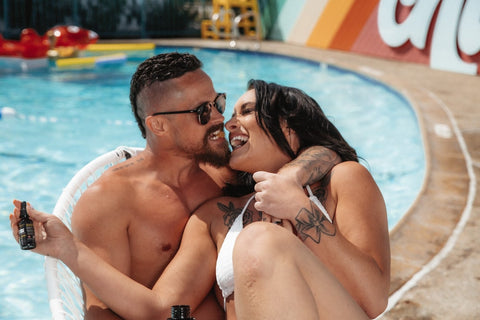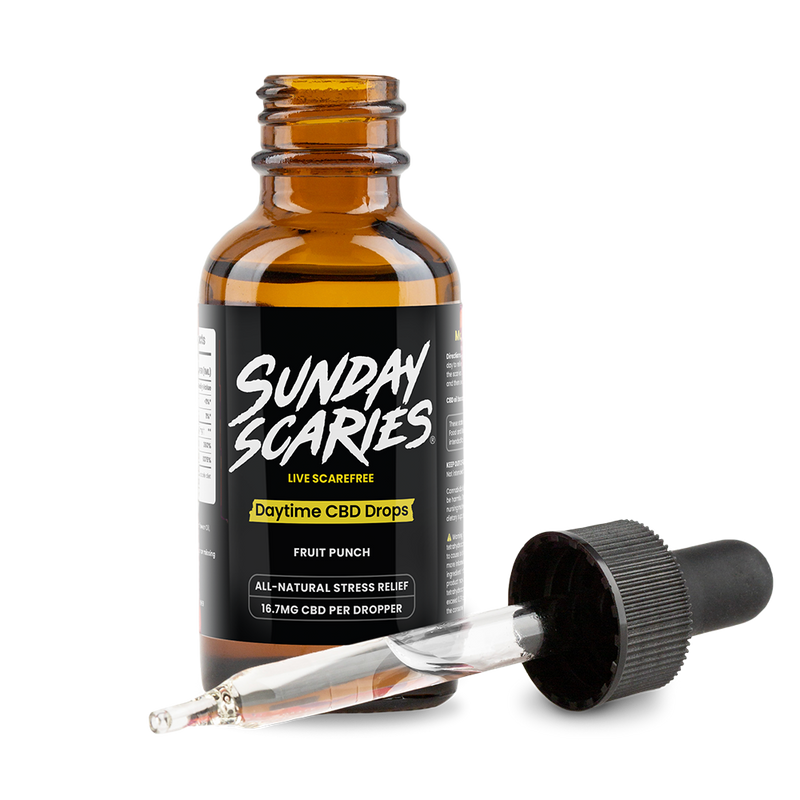
Relationship Anxiety or Not In Love? When to Mend It and When to End It

Are you breaking out in cold sweats at the mention of 'the talk,' or does the thought of long-term commitment have you considering a relocation to Venus or Mars?
Welcome to the world of Relationship Anxiety, where the lines between 'for better' and 'for worse' blur faster than your initial dating app swipe.
This article is the ultimate guide for relationship anxiety, aiming to help you identify its triggers, understand its impact, and equip you with effective coping strategies to navigate through a complex emotional landscape.
Find out whether you want to mend your relationship, or end it.
What is Relationship Anxiety?
Relationship anxiety, often referred to as "relationship-related anxiety" or "relationship anxiety disorder," is a psychological and emotional condition characterized by excessive worry, fear, or apprehension experienced within the context of a romantic relationship.
It typically manifests as a heightened sense of unease, insecurity, or doubt about the stability, trustworthiness, or future of the relationship. This anxiety can interfere with one's ability to enjoy and maintain a healthy and fulfilling partnership.
Relationship Anxiety is the jittery cousin of regular anxiety that specifically crashes your love-life party.
Imagine your love life as a peaceful sailboat, and relationship anxiety is that uninvited seagull that swoops in, steals your sandwiches, and squawks loudly while you're trying to navigate.
It's not merely about fearing commitment or panicking over "the talk"; it's so much deeper than that.
It's like experiencing a romantic dinner date while simultaneously grappling with the sensation of a colossal, unseen elephant weighing heavy on your chest.
Fun, right? Not quite.
Key Aspects of Relationship Anxiety: Unraveling the Love-Knots
Relationship anxiety is a real struggle that manifests in a myriad of ways.
From never ending doubt to an overbearing need for reassurance - it's a convoluted web of feelings that often leaves you baffled.
Let's dive into the turbulent tides of these key aspects, and remember, it's not just you against the waves, we're here navigating through it together.
The 12 Signs of Relationship Anxiety:
1. Perpetual Uncertainty
Constantly questioning the relationship's stability or your partner's feelings towards you is a common aspect of relationship anxiety that can affect you and your bae's mental health.
2. Fear of Rejection or Abandonment
This fear may result in clingy behavior or even pushing the partner away to avoid potential pain, and is usually caused by low self-esteem and insecurity.
3. Excessive Jealousy and Possessiveness
Feeling overly threatened by others and constantly monitoring your partner's actions can stem from fear of losing them or from past trauma.
4. Insecure Attachments
Often rooted in childhood experiences, insecure attachments manifest as difficulty trusting and forming secure bonds with partners. It's feeling like you're in the opposite of a safe space.
5. Excessive Reassurance Seeking
Doubting the relationship and seeking reassurance from your partner is a common way to cope with relationship anxiety. However, it can strain the relationship and create a cycle of seeking reassurance.
6. Negative Self-Talk
Relationship anxiety often comes with negative thoughts about oneself that can occur at any given moment, such as "I'm not good enough for my partner" or "They'll eventually leave me."
7. Negative Self-Perception
You might feel unworthy of love, leading to self-sabotaging behaviors and relationship insecurity. This self-fulling prophecy will hurt your chances of relationship stability.
8. Communication Overload
Overcompensating by excessively communicating feelings and fears may overwhelm your partner. Simply telling your partner what's on your mind is healthy, but when you communicate overbearingly it can trigger anxiety.
9. Hypersensitivity to Change
Normal changes or shifts in relationship dynamics can trigger intense anxiety. Being scared of any sort of change and rejecting your partner's growth can lead to relationship insecurity.
10. Physical Symptoms
Relationship anxiety can manifest physically with symptoms like restlessness, increased heart rate, gastrointestinal distress, and sleep disturbances. Seek immediate professional help if these are extreme cases.
11. Overanalyzing Partner’s Actions
You might find yourself reading too much into your partner's actions or words, trying to identify hidden signs of trouble. This can lead to the point where your partner feels wrongfully investigated.
12. Avoidance Behaviors
To cope with their anxiety, some individuals may engage in avoidance behaviors, such as avoiding conflicts, withholding emotions, or withdrawing from the relationship altogether.
What Causes Relationship Anxiety? The Culprits Behind the Chaos
If you're wondering why Cupid's arrow feels more like a boomerang hitting you in the face, you're not alone.
There are several reasons why relationship anxiety might have set up camp in your love life. Here are some of the main culprits behind the chaos:
Past Trauma:
Just like that time you ate an entire cheesecake and now can't even look at cheese without feeling queasy, past traumatic experiences in relationships can leave a lasting impact. This can make you extra cautious (read: anxious) in your current relationships.
Low Self-Worth:
If you see yourself as less valuable than a half-eaten bag of chips, you're likely to feel anxious in your relationships. Why? Because you're constantly worried that your partner will see you the same way. Having high self-worth is key.
Emotional Neglect:
If you've been treated like an old, forgotten Barbie in the attic in past relationships, you're bound to feel anxious in your current one. Emotional neglect can make you feel unworthy of love and attention, causing a whole lot of relationship anxiety.
Fear of the Unknown:
Let's face it, the future can be as scary as finding a spider in your shoe. The uncertainty of where your relationship is heading can be a breeding ground for anxiety and make you feel insecure.
Anxiety Disorders:
A category of mental health conditions characterized by excessive and persistent worry, fear, or apprehension. These disorders can significantly impact your relationship and may include generalized anxiety disorder, panic disorder, social anxiety disorder, and specific phobias.
Attachment Difficulties:
Sometimes, our early-life experiences with our caregivers can shape how we form relationships as adults. If you were playing hide-and-seek with secure attachments as a child, you might find it tough to connect securely with your romantic partners as an adult.
Remember, while these are common causes, they aren't the end-all be-all.
Everyone's love life is as unique as their Netflix algorithm, so what triggers your relationship anxiety might be different.
And that's okay. We're all figuring it out one awkward date at a time.
Let's dig more into attachments...
Unraveling the Enigma of Attachment Styles
When it comes to making sense of how we 'attach' in relationships, we're looking at four major styles in this emotional rodeo.
Let's do a roll-call of these styles and clear the fog around them:
Secure Attachment:
You're the 'Goldilocks' of relationships - everything feels just right, with no worry. You're comfortable with intimacy and independence, open to giving and receiving love. It's like enjoying a rom-com without the fear of a plot twist.
Anxious-Preoccupied Attachment:
Imagine being on a rollercoaster, but it's your emotions on the ride. You crave closeness but worry that your partner doesn't feel the same. It's like playing a game of 'he loves me, he loves me not' on repeat.
Dismissive-Avoidant Attachment:
You're the 'Lone Ranger' of relationships, preferring solo rides over tandem cycles. You may avoid close emotional contact or appear unconcerned with the relationship. It's like wanting to watch the movie but avoiding the popcorn.
Fearful-Avoidant (Disorganized) Attachment:
You're caught in a love conundrum, desiring closeness but fearing it at the same time. It's like wanting to dive into the ocean but being afraid of the waves. This can cause anxious feelings.
Remember, these styles aren't necessarily "good" or "bad". They may provoke you to improve and change as an individual, but if that's not your cup of tea it's important to ensure you have the right counterpart to your style.
More on that below.
After all, love is a journey, not a destination and knowing your attachment style as well as your partner's can help you understand each other and why you're both acting certain ways.

How Attachment Styles Affect Romantic Relationships
Let's talk about the not-so-secret agent in the room, the anxious attachment style".
This attachment style is like the spicy salsa to your nachos in the relationship world, but sometimes it can get a bit too hot to handle.
If you're constantly thinking your significant other is about to start playing an Adele breakup song, you might be in the grasp of this sneaky style.
Now, let's bring in the superhero of our story, the "healthy relationship".
Picture it as the Superman to your Lois Lane - always there to save the day. It balances understanding, communication, a wee bit of compromise, and, of course, a lot of laughs.
It's like a perfectly brewed cup of coffee on a Sunday morning; comforting, warm and just right.
However, between our secret agent and superhero, we've got a whole ensemble of "attachment styles" playing their parts.
Some are like the cool best friends adding fun and support, while others are like the plot twists that keep you on your toes. But remember, every character is necessary to keep the story going.
Your "supportive partner" comes in like the ultimate sidekick. They understand your attachment style, even if it's as complicated as trying to solve a Rubik's cube blindfolded.
They are there, sticking with you through the anxiety tornado, holding your hand, and maybe even bringing ice cream.
So how do these characters influence our story? Well, they make it a blockbuster hit, packed with emotion, drama, action, and yes, a bit of relationship anxiety.
But with the right understanding, lots of love, and a sprinkle of humor, you're bound to enjoy this thrilling ride - popcorn and all.
What is ROCD?
ROCD, or Relationship Obsessive-Compulsive Disorder, is a form of OCD where a person experiences intrusive, unwanted thoughts and doubts about their romantic relationship.
These thoughts often cause extreme anxiety, even if the relationship is healthy and loving. For example, someone with ROCD might constantly question, "Do I really love my partner enough?" or "What if there's someone better for me?" They may obsess over their partner’s minor flaws, replay small arguments, or seek constant reassurance from friends or family.
Even when everything is going well, their mind fixates on doubts and fears, making it difficult to fully relax and trust their feelings. ROCD isn't about the actual state of the relationship—it's about the obsessive need for certainty that the disorder creates.
Now that we know all the problems that cause relationship anxiety, let's slide into how to solve them.
10 Remedies to Soothe Your Relationship Anxiety
1. Communicate, don't Ruminate:
Share your fears with your partner; it's better to communicate instead of turning your mind into a worry-brewing coffee pot. Expresso yourself! But not to the point where it causes jitters for your boyfriend or girlfriend.
2. Self-Love Isn't Just a Song by Justin Bieber:
Practice self-love and self-care; don't rely solely on your partner for your happiness. Remember, you're a whole snack, not just a side dish! Building trust with your partner starts with nurturing your own well-being.
3. Therapy isn't a Dirty Word:
Consider seeking professional help if your anxiety feels overwhelming. Like a mental workout with your own personal trainer, therapy helps you flex your coping muscles. Couple's therapy with a licensed therapy is no longer stigmatized.
4. Mindfulness, not Mind-Full-ness:
Practice mindfulness to stay present in the moment. It's like being on a first-name basis with your thoughts. Doubts and worry cause trigger low self-esteem. Try journaling, yoga or meditation as your first step.
5. Set Boundaries, not Land Mines:
Establish personal boundaries in your relationship to ensure mutual respect and understanding. It's like building a love fort, not a fortress of solitude. Romantic relationships deserve space.
6. Put on Your Detective Hat:
Identify your triggers for relationship anxiety. It's like playing Sherlock Holmes, but the mystery to solve is your emotions. Being aware of your reactions is a healthy life practice.
7. Positivity is Key, not a Luxury:
Encourage and engage in positive conversations with your partner. Think of it as emotional sunshine on a cloudy day. Know their attachment style and converse accordingly.
8. Practice Patience, not Panic:
Understand that overcoming anxiety takes time. Rome wasn't built in a day, and neither is mental peace. Start to feel comfortable knowing that not everything needs to be perfect all the time.
9. Embrace Uncertainty, don't Wrestle it:
Accept that uncertainty is a part of life and love. It's like an unexpected plot twist in your favorite rom-com. We never know what life will bring, so it doesn't make sense to always worry about it.
10. Remember, You're a Team:
Work together to manage these issues. After all, the couple that slays anxiety together, stays together. And remember, a licensed therapist can be part of that team.

What Studies Say About Relationship Anxiety: The Love Lab Experiments
Welcome to the 'Love Lab', where we don our lab coats, magnifying glasses, and curiosity caps to delve deep into the world of "relationship anxiety".
These studies might not be as exciting as binge-watching a season of "Stranger Things", but they're important to know when dealing with relationship insecurity and they back up our findings.
The Emotional Connection Enigma: The 'University of Waterloo' Study
Our first contender is a study from the University of Waterloo. It suggests that individuals with "anxious attachment styles" often struggle to form an "emotional connection" with their partners.
This can lead to feelings of uncertainty, jealousy, and overall relationship anxiety. The study emphasizes the importance of addressing these attachment styles in relationships for long-term success.
The Self-Fulfilling Prophecy: The 'University of Denver' Study
Our second contender is a study from the University of Denver that highlights how our attachment styles can create a self-fulfilling prophecy in our relationships.
For example, someone with an anxious attachment style may constantly seek reassurance from their partner, which can lead to their partner feeling overwhelmed and emotionally distant.
This then reinforces the anxious person's belief that they are not worthy of love and attention, creating a cycle of insecurity and anxiety.
Remember, folks, these studies are not here to make you feel like a deflated love balloon. Instead, they provide insights to help us navigate the often turbulent seas of love. Think of them as your relationship GPS, guiding you towards a healthier emotional connection.
What Love Experts Say About Relationship Anxiety
Here's what leading love experts have to say about relationship anxiety:
Dr. John Gottman:
Renowned relationship expert and clinical psychologist, Dr. Gottman states, "Anxiety is a silent killer of relationships. It creates a climate of negativity, suspicion, and withdrawal. To nurture a relationship, one must first address personal issues related to anxiety."
Esther Perel:
A prominent relationship therapist, Esther Perel suggests, "Anxiety can mask itself as constant concern or worry about the relationship. But it's essential to recognize it as a personal issue and not a relationship issue. Nurture the 'I' in order to strengthen the 'Us.'"
Dr. Sue Johnson:
Dr. Sue Johnson, a leading expert in the field of couples therapy observes, "Attachment anxiety can manifest as a fear of abandonment or an overreliance on one's partner. Recognizing these patterns is the first step towards establishing more secure and resilient bonds."
Mike Sill:
Sunday Scaries expert and anxiety guru, Mike Sill says, "Relationship anxiety is usually caused by insecurity, low self-esteem, self-doubt, and a lack of self awareness. The core issue is oftentimes people try to change one's partner, versus working on improving themselves."
At Sunday Scaries, we polled our customers and found that 24% of our Scary Squad members take our stress relief products in order to relieve their relationship stress.
How Do the Sunday Scaries Affect Relationship Anxiety?
The Sunday Scaries can come knocking on your door, uninvited, with an entourage of looming deadlines, unwashed laundry and a moral hangover from partying too hard the night before.
The Sunday Scaries can cause individual doubt and insecurity, and have you feeling alone and isolated even when you're not. They're hard to shake and they're a lot like that annoying coworker who never seems to take a hint.
Spending quality time with your partner can be the perfect antidote to the Sunday Scaries. You could engage in simple activities like cooking together, going on a hike or even rewatching a feel movie that you've seen a thousand times already.
By creating a shared experience, you're not only building a stronger bond, but you're also crafting a beautiful diversion from the stress build-up.
Moreover, you can turn the tables on the Sunday Scaries by making it a shared experience. Yes, that means tackling that mountain of laundry together, laughing at your hangover by reminiscing on the fun you had the night before, or planning the upcoming week's schedule with your partner.
Not only does it help lighten the load (literally and metaphorically), it also creates an opportunity for communication and teamwork. Use it to your advantage for building trust.
In essence, you're using the power of 'we' to vanquish the Sunday Scaries.
So, next time the Sunday Scaries try to rain on your parade, grab your partner's hand and tell them: "You can stand under my umbrella, ella, ella, eh, eh eh."

Can CBD Oil Help with Relationship Stress?
Yes, CBD oil could potentially help with those feelings of worry and stress that stem from frustration in relationships. Research suggests that Cannabidiol (CBD) has shown promising results in managing stress.
CBD oil interacts with the body's endocannabinoid system, affecting serotonin levels, which play a key role in mood regulation.
Don't you just love those situations when your brain decides to play out every possible negative scenario that may occur in your relationship, right when you're about to sleep?
It's like your brain's favorite pastime is torpedoing your self-esteem and sprouting doubts faster than mushrooms in a damp cellar.
Before you start laying in bed googling other "ways to overcome relationship anxiety," or consider moving to a deserted island (tempting, we know), there might be a more 'chilled out' solution: CBD oil.
Now, we're not saying that CBD oil is going to swoop in like a superhero, cape flapping in the wind, and miraculously sort out your relationship issues (though, wouldn't that be something?).
But, evidence suggests that CBD, with its stress-relief properties, could potentially help as it will enable you to relax and get out of your own head.
CBD is known to promote a healthy sense of calm and well-being, like when you're on the beach staring out at the water during a sunset.
This zen-like state can be a game changer in managing anxiety, and might just help you keep a lid on those Sunday Scaries or the mid-week 'What-ifs.'
So, while a good heart-to-heart with your partner is still the most recommended route, a little help from some CBD might not hurt either.
After all, who doesn't need an occasional chill pill?
Recognizing When to Mend It or End It: Navigating the Crossroads of a Healthy Relationship
We're diving into the deep end of the love pool now. We're talking about that dreaded junction in your relationship journey - 'Mend It or End It'.
It's like deciding between ordering pizza or going for that salad - tough choice, right? We know it's harder than that but these lists will make it much easier for you to make your decision.
Reasons to Mend the Relationship
Shared History and Experiences:
All the shared memories and experiences offer a strong reason to mend the relationship. These moments hold the power to remind you why you fell in love in the first place.
Emotional Investment:
The emotional investment in a relationship is worth considering. If you've poured time, effort, and emotions into building a bond, it's often worth the effort to mend and restore it.
Shared Goals and Values:
A shared vision for the future and aligning values is a strong reason to mend a relationship. If you and your partner have common interests and similar life goals, these serve as a firm foundation to rebuild upon.
Growth and Learning:
Every relationship, even the challenging ones, offer opportunities for personal growth and learning. Identifying and overcoming your differences can strengthen your bond and contribute to individual development.
Love and Affection:
Love is a compelling reason to mend a relationship. If the affection and love are still present, it's worth trying to fix the issues and rekindle the spark.
Reasons to End the Relationship
Persistent Unhappiness:
If you find yourself constantly unhappy and emotionally drained, it could be a signal that the relationship is causing more harm than good.
Lack of Respect:
Mutual respect is crucial in a relationship. If there’s a persistent lack of respect, it may be time to reconsider the relationship.
Abuse:
Any form of abuse, whether physical, emotional, or psychological, is a definite reason to end the relationship immediately. No one should ever endure abusive behavior.
Incompatible Life Goals:
If you and your partner have vastly different life goals that can't be reconciled, it might be best to part ways. A fulfilling relationship usually involves a shared vision of the future.
Lack of Love and Affection:
In a healthy relationship, love and affection should be present. If you feel like your partner has checked out emotionally, it may be time to reassess the relationship.
In conclusion, recognizing when to mend or end a relationship can be challenging, but ultimately it comes down to prioritizing your well-being and happiness.

When to Seek a Medical Professional: Turning the Corner on General Anxiety
There's no shame in the game of seeking help, especially when dealing with the gnarly monster we like to call general anxiety.
If it's making an unwanted cameo in your love story, it's time to put your foot down and draw the line.
Experiencing anxiety is like trying to dance the tango with two left feet - it's tricky, exhausting, and let's be honest, not a great sight.
When you and your partner notice that anxiety has overstayed its welcome, turning your relationship into an unending loop of stress and worry, it's time to hand the mic over to a licensed therapist.
These professionals are like the savvy navigators of the complex maze of human emotions, guiding you through the tight corners of your mind and offering the relief you seek.
Remember, it's you and your partner against the issue, not against each other. With the right help, you can ensure that anxiety becomes just another chapter in your story, not the entire book.
And, hey, when you get to the other side, you'll be a stronger, better, power couple. How's that for a happily ever after?
Wrapping it up: Anxiety & Love
Damn. We've covered quite the emotional marathon, haven't we?
We revealed how to know if you're a person experiencing relationship anxiety, exposed the causes of relationship anxiety, defined the attachment styles and broke down how to cure your love woes.
We also touched on how partners can cure the Sunday Scaries together, how CBD can lend a helping hand and how a licensed therapist might be able to assist you in couples therapy.
Just your average Tuesday, right?
It's okay to seek help, both from your partner and from professionals. Trust me, therapists are the Rafikis of emotional turmoil, guiding you out of the darkest caverns of your mind.
Now, let's not forget the important lesson we learned from our pre-school days - it’s always better to mend it than end it. Your relationship deserves that extra effort.
However, if the relationship starts to resemble a horror movie more than a romantic comedy, do not forget your right to change the channel.
If it's toxic, harmful or you know in your heart it's not the right fit... move on.
Above all else, remember to love yourself, because as RuPaul says, "If you can't love yourself, how in the hell are you gonna love somebody else?"
Here’s to navigating the labyrinth of anxiety & love.

 CBD Gummies
Stress Relief
CBD Gummies
Stress Relief
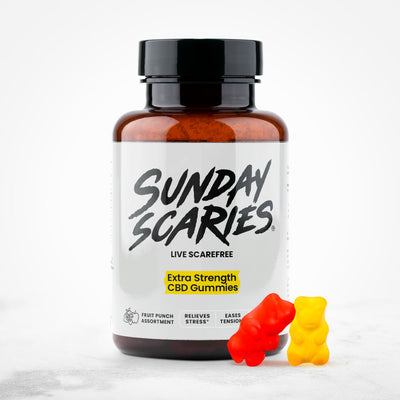 Extra Strength CBD Gummies
Stress Relief
Extra Strength CBD Gummies
Stress Relief
 Vegan CBD Gummies
Stress Relief
Vegan CBD Gummies
Stress Relief
 CBD Gummies for Focus
Focus Boost
CBD Gummies for Focus
Focus Boost
 CBD Candy
Mood Lift
CBD Candy
Mood Lift
 CBD Daytime Oil
Stress Relief
CBD Daytime Oil
Stress Relief
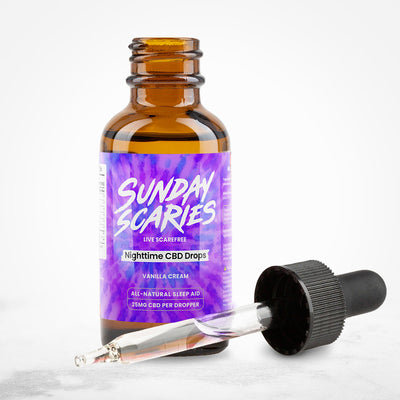 CBD Sleep Oil
Sleep Aid
CBD Sleep Oil
Sleep Aid
 CBD Dog Treats
Stress Relief
CBD Dog Treats
Stress Relief
 Side Piece Bundle
Stress Relief
Side Piece Bundle
Stress Relief
 Rando Bundle
Stress Relief
Rando Bundle
Stress Relief
 Sunrise & Sunset CBD Oil Bundle
Stress Relief
Sunrise & Sunset CBD Oil Bundle
Stress Relief
 5mg Delta-9 Gummies
Euphoria
5mg Delta-9 Gummies
Euphoria
 10mg Delta-9 Gummies
Euphoria
10mg Delta-9 Gummies
Euphoria
 THC Gummies for Sleep
Sleep Aid
THC Gummies for Sleep
Sleep Aid
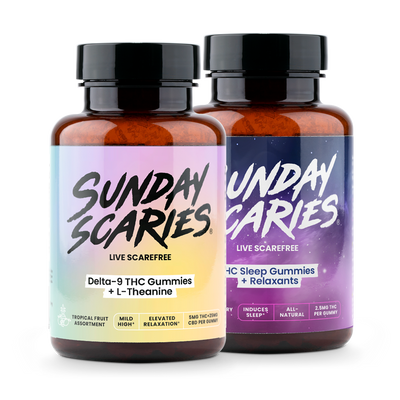 Day & Night THC Gummies Bundle
Stress Relief
Day & Night THC Gummies Bundle
Stress Relief
 Mushroom Gummies
Focus Boost
Mushroom Gummies
Focus Boost
 Shilajit Gummies
Focus Boost
Shilajit Gummies
Focus Boost
 Sunday Scaries Hat
Sunday Scaries Hat
 Sunday Scaries Dad Hat
Sunday Scaries Dad Hat
 Sunday Scaries T-Shirt
Sunday Scaries T-Shirt
 Sunday Scaries Pocket Tee
Sunday Scaries Pocket Tee
 Sunday Scaries Tank Top
Sunday Scaries Tank Top
 Sunday Scaries Sweatshirt
Sunday Scaries Sweatshirt
 Sunday Scaries Blanket Jacket
Sunday Scaries Blanket Jacket
 Sunday Scaries Sweatpants
Sunday Scaries Sweatpants

